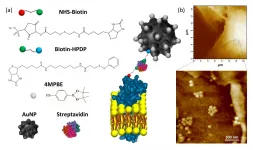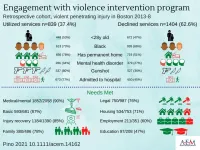Tocilizumab cuts mortality risk in severely ill COVID-19 patients finds new trial conducted in India
2021-03-08
(Press-News.org) Tocilizumab, an anti-inflammatory drug used to treat rheumatoid arthritis, improves outcomes in severely ill COVID-19 patients, finds the results of a new trial conducted in hospitals across India -- one of the world's most ethnically diverse countries. Researchers from the University of Bristol and Medanta Institute of Education and Research in India who led the study, published in The Lancet Respiratory Medicine, say it adds to existing evidence supporting the drug's use in critically ill patients.
Conducted in 12 public and private hospitals across India, the COVID India Tocilizumab (COVINTOC) phase 3 randomised controlled trial aimed to investigate whether tocilizumab could prevent disease progression and mortality in hospitalised patients with moderate to severe COVID-19.
The study team recruited 180 patients (age 18-years and over) who had been hospitalised with moderate to severe COVID-19. Of these, 89 patients were randomised to receive standard care, and 91 patients were randomised to receive standard care plus tocilizumab.
Patients were followed up over a 28-day period to record any clinical improvement markers and assess disease progression from moderate to severe or from severe to death. The team also recorded whether patients experienced adverse events, serious adverse events, and post-treatment infections, and requirement for renal replacement drugs.
Analysis of the data revealed a subset of patients with severe disease in whom tocilizumab might have a reduced risk for progression to death if treated with tocilizumab in addition to standard care. However, clinical parameters or biomarkers to reliably identify these patients and the optimal timing of treatment during COVID-19 progression remain unknown. The authors conclude that while the study does not support the routine use of tocilizumab in adults with COVID-19 it adds to the growing evidence suggesting it may help some severely ill patients.
The trial's lead co-author, Professor A. V. Ramanan from the University of Bristol's School of Clinical Sciences, and Consultant Paediatric Rheumatologist at Bristol Royal Hospital for Children, said: "Our study suggests tocilizumab might still be effective in patients with severe COVID-19 and so should be investigated further in future studies. It adds to existing evidence from the RECOVERY and REMAP-CAP studies which demonstrate that tocilizumab does have a significant impact on reducing mortality in those with COVID-19 requiring oxygen or being ventilated.
"After dexamethasone (steroids), this is still the most significant advance in the treatment of COVID that has an impact in reducing deaths."
Lead co-author Dr Arvinder Soin, Chairman of the Medanta Liver Transplantation Institute at Gurugram, India, said: "While there were no differences in mortality and the need for ventilation among the two groups of patients when moderate and severe categories of patients were considered together, a subgroup analysis of the severe patients in the two groups showed a lower mortality at 28 days (8/50; 16 per cent) among those who received tocilizumab compared to those who did not (14/41; 34 per cent). The reported adverse events did not differ between the tocilizumab and standard care arms.
"Given the conflicting results of the previous studies, millions were wasted last year on the indiscriminate use of tocilizumab, as the precise stage of the disease in which to use the drug was not clear. This study plugs an important gap in knowledge on COVID treatment and clarifies that tocilizumab should be administered to patients in the severe category. Incidentally, last month, two major studies from the UK - the RECOVERY Trial and the REMAP-CAP study - have revealed similar findings, that tocilizumab reduces mortality among patients with severe COVID-19."
The trial was conducted against incredible odds across multiple sites under difficult conditions in a country that has the second highest COVID-19 caseload in the world.
Professor Ramanan added: "Challenges to conducting randomised controlled trials during the COVID-19 pandemic are exacerbated in low-and middle-income countries, and several hurdles were encountered during this trial in India. Patients treated with drugs not licenced for the condition they have or compassionate use of treatments in patients with COVID-19 is common and can impede enrolment into clinical trials. Ensuring follow-up is challenging for patients who are likely to be discharged early because of the high demand on hospital resources and for patients who might have logistical difficulty travelling for return visits. We believe it is important that all potential therapies be trialled across diverse settings, not only in North America and Europe."
INFORMATION:
The study was funded by Medanta Institute of Education and Research, Roche India, Cipla India, and Action COVID-19 India.
Paper
'Tocilizumab plus standard care versus standard care in patients in India with moderate to severe COVID-19 associated cytokine release syndrome (COVINTOC): an openlabel, multicentre, randomised, controlled, phase 3 trial' by Dr Arvinder S Soin et al is published in The Lancet Respiratory Medicine.
ELSE PRESS RELEASES FROM THIS DATE:
2021-03-08
Trolling and extreme levels of abuse can kill an online campaign but momentum can be maintained, and the energy and morale of exhausted activists effectively restored, by tactical retreat and taking time out, new research into the landmark 'No More Page 3' campaign in the United Kingdom shows.
Dr. Sarah Glozer of the University of Bath School of Management and Dr. Lauren McCarthy of the Royal Holloway University of London School of Business and Management studied the 'No More Page 3' campaign, which from 2012 lobbied The Sun mass-circulation newspaper to stop publishing a photo of a topless woman on page 3, a daily feature launched in 1970. Page 3, the No More Page 3 campaign argued, was a symbol of institutionalised sexism. The Sun removed the Page 3 feature ...
2021-03-08
The earliest multicellular organisms may have lacked heads, legs, or arms, but pieces of them remain inside of us today, new research shows.
According to a UC Riverside study, 555-million-year-old oceanic creatures from the Ediacaran period share genes with today's animals, including humans.
"None of them had heads or skeletons. Many of them probably looked like three-dimensional bathmats on the sea floor, round discs that stuck up," said Mary Droser, a geology professor at UCR. "These animals are so weird and so different, it's difficult to assign them to modern categories of living organisms just by looking at them, and it's not like we can extract their DNA -- we can't."
However, well-preserved fossil records ...
2021-03-08
Over 10,000 people in Europe use an assistance dog; think of guide dogs for people with a visual impairment, hearing dogs for people with a hearing impairment, medical response service dogs and psychiatric service dogs.
According to a UN-agreement and the Dutch law, these dogs are welcome in stores, hospitals and other public places. However, in practice, many assistance dog users and their dogs are regularly refused entry. In the Netherlands, four out of five assistance dog users indicate that they regularly experience problems with this.
Often, hygiene reasons are ...
2021-03-08
Researchers at the UAB have designed minimalist biostructures that imitate natural enzymes, capable of carrying out two differentiated and reversibly regulated activities thanks to a unique combination of structural and functional properties. The strategy used opens the door to the creation of "intelligent" nanomaterials with tailor-made combinations of catalytic functions.
There is an increasing interest in synthetic systems that can execute bioinspired chemical reactions without requiring the complex structures that characterise enzymes in their components. One of the most explored approaches is the self-assembly of peptides - molecules smaller than proteins - due to their biocompatibility and how their structural and functional properties can be controlled.
Researchers from the ...
2021-03-08
Several processes in the human body are regulated by biochemical reactions involving hydrogen peroxide (H2O2). Although it can act as a 'secondary messenger', relaying or amplifying certain signals between cells, H2O2 is generally toxic because of its oxidant character. The latter means that it converts (oxidizes) biochemical molecules like proteins and DNA. The oxidizing property of H2O2 is of potential therapeutic relevance for cancer, though: deliberately causing tumor cells to increase their H2O2 concentration would be a way to destroy them. In light of this, but also for monitoring pathologies associated with H2O2 overproduction, it is crucial to have a means to reliably quantify hydrogen peroxide concentrations in the extracellular environment. Now, Leonardo Puppulin ...
2021-03-08
A team of researchers from the CHUM Research Centre has identified new biomarkers associated with the severity of COVID-19 in infected patients.
Recent scientific literature has shown that the immune response plays a central part in the severity of COVID-19 disease. Understanding the immune responses generated during the course of the disease is therefore essential to determine which patients are at highest risk for serious complications and death from the disease.
In a new study published in the Journal of Clinical Investigation, scientists and clinicians led by Dr.?Catherine Larochelle, researcher at the CHUM Research Centre, have ...
2021-03-08
Bacteria integrate genetic material from other bacterial strains more easily than previously thought, which can lead to improved fitness and accelerated evolution. This is shown in a recent study by biophysicists at the University of Cologne. The team analysed genome transfer between bacteria of different lineages. The study was published in the journal PNAS.
In the experiment, the team brought one strain of bacteria into contact with DNA fragments from another strain. The uptake of foreign genetic material is known as horizontal gene transfer -- in contrast to vertical gene transfer, by which genes are inherited from a parent cell of the same lineage. The results show that ...
2021-03-08
DES PLAINES, IL - A Boston violence intervention advocacy program is effectively engaging the client population that hospital-based violence intervention programs (HVIPs) have been designed to support. This is the conclusion of a study titled Boston Violence Intervention Advocacy Program: Challenges and Opportunities for Client Engagement and Goal Achievement, to be published in the March 2021 issue of Academic Emergency Medicine (AEM), a journal of the Society for Academic Emergency Medicine (SAEM).
According to the study, HVIPs should consider which types of client needs prove most challenging to address and which novel strategies will engage vulnerable populations not typically targeted by intervention programs. ...
2021-03-08
The sensor network MUCCnet (Munich Urban Carbon Column network) consists of five high-precision optical instruments that analyze the sun's light spectra. They measure the concentration of the gases carbon dioxide (CO2), methane (CH4) and carbon monoxide (CO). Since each gas has its own unique spectral "fingerprint", concentrations of these gases can be determined in the columns of air between the instruments and the sun.
"By measuring a vertical column of the atmosphere, local disturbances, such as the disproportionate influence of neighboring stacks, can be removed. Therefore, this type of greenhouse gas balancing is considered particularly robust and accurate," says Prof. Jia Chen.
Measurements at five locations in and around Munich
One of MUCCnet's measurement devices is ...
2021-03-08
A new study by the international network Women In Supramolecular Chemistry (WISC) has highlighted the equality, diversity and inclusion (EDI) issues faced by women and marginalised groups working within that field.
The network has also set out a 'calling in' approach to address these issues.
The study, led by Dr Jennifer Leigh and Dr Jennifer Hiscock (both University of Kent) alongside WISC's wider team of international researchers, found that both men and women in the supramolecular community wanted to see more mentoring opportunities and more visibility for women and marginalised groups. There is a desire for more guidance during the transition from postdoctoral researcher to independent Principal Investigator, to ensure women can be retained ...
LAST 30 PRESS RELEASES:
[Press-News.org] Tocilizumab cuts mortality risk in severely ill COVID-19 patients finds new trial conducted in India





